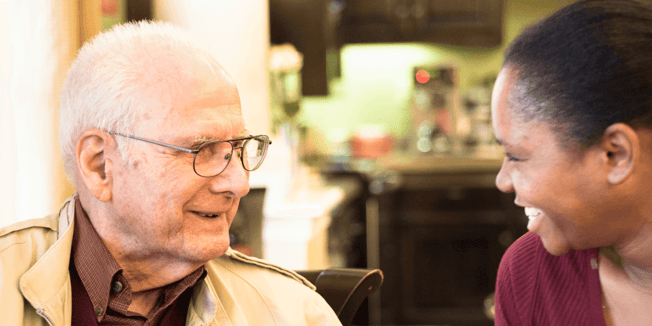Producing a Safe House: The Value of Specialized Memory Care
The establishment of specialized memory care facilities is necessary in providing a safe house for individuals dealing with cognitive difficulties such as Alzheimer's and dementia. These specialized atmospheres not just prioritize the physical safety and security of residents yet likewise enhance their emotional wellness through individualized care and significant engagement. As family members navigate the complexities of these problems, the significance of selecting the right memory care center ends up being apparent. Understanding the crucial attributes that specify efficient memory care can profoundly impact the lifestyle for both locals and their enjoyed ones, motivating a deeper exploration into this vital topic.
Recognizing Memory Care
Memory care centers are specifically designed to cater to people coping with cognitive impairments, such as Alzheimer's illness and other kinds of mental deterioration. These facilities offer a structured atmosphere that focuses on safety, convenience, and specialized assistance tailored to the unique demands of citizens. Understanding memory care requires identifying the specific challenges dealt with by people with cognitive decrease, consisting of amnesia, complication, and modifications in behavior.In a memory care setting, trained personnel are furnished to use caring aid, guaranteeing that homeowners receive proper care while maintaining their self-respect. The emphasis is on producing a nurturing ambience that minimizes stress and anxiety and boosts top quality of life. Tasks are often made to engage homeowners cognitively and socially, advertising interaction and deliberate living.Moreover, family members participation is a crucial part of memory care, as it urges emotional connections and support for both homeowners and their liked ones. Memory care centers not only concentrate on the physical aspects of care yet also address the psychological and mental demands of people, cultivating a setting where they can prosper in spite of their constraints. Understanding memory care is essential for making notified decisions about the ideal choices for enjoyed ones dealing with cognitive difficulties.
Secret Functions of Specialized Facilities
Specialized memory care centers incorporate various essential features that enhance the health of locals with cognitive impairments. Central to these facilities is a safe and secure atmosphere developed to promote safety and security and stop straying, often including enclosed outdoor rooms and regulated accessibility points.Additionally, the format of these centers is deliberately structured to reduce confusion and disorientation. Acquainted, homey setups assist residents really feel much more comfy and reduce anxiousness. Team member are specially educated in dementia care, utilizing techniques that foster interaction and understanding with residents.Moreover, specialized memory care programs often consist of engaging activities customized to the cognitive levels of the residents. These activities not only boost cognitive features but likewise motivate social interaction, improving homeowners' high quality of life.Another considerable function is the consolidation of innovation, such as sensory excitement devices and keeping track of systems that assure individual demands are promptly addressed. Finally, individualized care strategies are established for each local, acknowledging their unique histories, preferences, and needs. Together, these crucial functions produce a helpful atmosphere that values the self-respect of people with memory disabilities while addressing their particular difficulties completely.
Advantages for Locals and Families
As family members look for the finest options for their liked ones with cognitive impairments, the benefits of specialized memory care centers come to be increasingly obvious. These environments are developed specifically to provide to the unique demands of individuals with memory obstacles, cultivating a sense of security and comfort.Residents take advantage of customized care plans that address their certain cognitive and psychological needs, boosting their total high quality of life. Specialized staff learnt dementia and Alzheimer's care give consistent support, ensuring that each resident receives personalized attention and interaction. This customized strategy not just promotes cognitive stimulation however also helps in lessening anxiety and complication, common amongst people with memory disorders.For households, the assurance that originates from understanding their liked ones remain in a risk-free, safe and secure environment is important. Memory care centers often facilitate family members involvement through normal updates, instructional workshops, and assistance groups, assisting households browse the intricacies of mental deterioration care. This collaborative strategy strengthens the bond between homeowners and their family members, cultivating an encouraging neighborhood that improves well-being for everyone included. Alzheimer’s Care Charlotte. Inevitably, specialized memory care gives a holistic service that profits both citizens and their families

Picking the Right Memory Care
Selecting the best memory care center needs mindful consideration of numerous aspects to assure that the distinct needs of the person are met. Assess the level of care required, as memory care includes a range of services, from basic support to specialized clinical interest. Review the staff-to-resident ratio; a higher ratio often suggests more customized focus and care (Alzheimer’s Care).Additionally, take into consideration the facility's atmosphere. A safe, comfy, and engaging environment can especially impact the well-being of citizens. Seek facilities that advertise social communication and cognitive engagement, which are vital for people with memory impairments.Moreover, ask about the training and certifications of the personnel. A trained group experienced in taking care of memory-related problems can provide essential support and improve the lifestyle for residents.Visiting prospective centers is basic; observe communications in between team and homeowners to gauge the general environment. Lastly, think about the facility's location and ease of access for family members check outs, as ongoing family members involvement is essential for both emotional support and care connection. By meticulously assessing these elements, families can make enlightened choices that prioritize the wellness and joy of their liked ones
Enhancing Life Through Care
Enhancing day-to-day life for individuals in memory care involves developing a structured yet flexible setting that promotes regular and interaction. A well-designed memory care program focuses on the special demands of locals, allowing them to prosper within a safe and encouraging environment. Establishing day-to-day routines aids minimize anxiety and disorientation, promoting a complacency and familiarity.Activities ought to be customized to the cognitive levels and rate of interests of the locals, incorporating both mental and physical excitement. This may consist of memory-enhancing workouts, arts and crafts, gardening, or music treatment, which not only involve the people but additionally encourage social interaction among peers. Team training is necessary, as caretakers need to be furnished with specialized skills to assist in these tasks properly while being delicate to the emotional and emotional needs of each resident.Incorporating innovation, such as memory help or interactive applications, can even more improve day-to-day experiences, offering homeowners with tools to recall memories or connect with enjoyed ones. Ultimately, improving life in memory care centers is about fostering dignity, freedom, and pleasure, allowing individuals to lead fulfilling lives regardless of their cognitive obstacles.
Frequently Asked Concerns
What Types of Memory Conditions Receive Specialized Memory Care?

How Do Team Certifications Differ in Memory Care Facilities?
Team certifications in memory care facilities generally encompass specialized training in dementia and click for more Alzheimer's care, differentiating them from typical caregiving roles. Specialists frequently possess qualifications in gerontology, psychology, or nursing, along with hands-on experience with memory problems. Educating programs highlight interaction strategies, behavior administration, and comprehending the unique difficulties faced by people with cognitive impairments. This specific understanding warranties that personnel can efficiently support homeowners, promoting a risk-free and caring atmosphere tailored to their demands.
Are Memory Care Facilities Covered by Insurance or Medicare?
Memory care centers might get varying degrees of insurance coverage from insurance and Medicare, depending upon individual policies and certain situations. Generally, Medicare does not cover long-term care in these facilities yet might supply restricted benefits for short-term remains or rehab services - Memory Care. Alternatively, some private insurance coverage strategies may partially cover memory care costs. It is vital for family members to review their insurance coverage and talk to companies to recognize their coverage options extensively
What Activities Are Usually Supplied in Memory Care Programs?
Memory care programs generally provide a series of activities created to involve citizens and promote cognitive function. Typical activities include arts and crafts, songs treatment, memory therapy, and physical exercise customized to private capacities. Social interaction is urged through group games, horticulture, and organized getaways, fostering a sense of community and belonging. These activities are carefully structured to enhance memory recall and boost total well-being, ensuring an encouraging setting for people with memory disabilities.
Exactly How Can Families Keep Associated With Their Family member's Care?
Family members can remain included in their liked one's care by frequently connecting with caretakers and joining care planning conferences. Memory Care Charlotte. Developing a routine for visits can give psychological support and connection. Engaging in activities with their liked one, such as taking part in entertainment treatments, enhances links. Furthermore, families must educate themselves about the details conditions affecting their loved one to foster understanding and advocate successfully for their needs within the care atmosphere